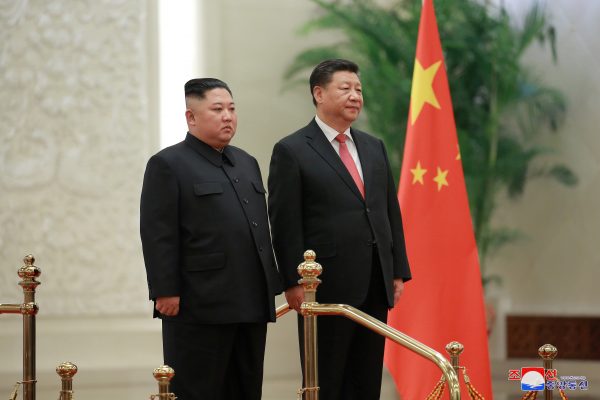It is not clear whether this shift in the strategic community is a state-directed initiative to shape the broader Chinese policy community’s narrative. It is also not clear whether this view is consistent with the internal conclusion of the Chinese government on the matter. But what is clear is that this view corroborates with the Chinese government’s approach to North Korea. China’s current North Korea policy is premised on the notion that Kim is bona-fide committed to denuclearisation.
In Kim’s latest meeting with Xi in January 2019, he told Xi that North Korea will continue to adhere to its denuclearisation stance. Did Xi have confidence in Kim’s words?
Reportedly, Xi, being an ostensibly socialist leader, decided to trust Kim. Xi treated Kim like family during his stay in Beijing, arranging a private lunch with Xi’s wife Peng Liyuan and Kim’s wife Ri Sol-ju. They conversed over tea and went through photos taken from the previous visits. The venue was the historic Beijing Hotel where Kim’s grandfather Kim Il-sung used to meet with Mao Zedong and Zhou Enlai decades ago. It would be unthinkable for Kim to lie to Xi, the logic goes.
This may be a Chinese way of rationalising why Kim is serious about denuclearisation. At any rate, the consequence is that it sets free Xi from his ‘self-imposed’ restraint of not meeting with Kim. In the past, Xi refused to visit North Korea due to its nuclear development. North Korea’s nuclear weapons were also the reason for China to join the United States in slapping UN-mandated economic sanctions on North Korea. Kim’s expression of willingness for denuclearisation removed the barrier for the two to finally meet.
There is an ongoing debate over whether China is using the ‘North Korea card’ in its dealings with Washington, including in its trade negotiations with the United States, amid deepening rivalry and competition between the two superpowers. China is seen as the country that has the largest influence over North Korea.
China will not be in attendance at the Trump–Kim summit in Hanoi, but its presence will be felt. North Korea seems to be emitting a renewed sense of confidence in dealing with the United States since Kim’s fourth meeting with Xi in January, in which they agreed to deal with the nuclear negotiation with the United States through ‘joint research and coordination’.
It also makes sense for Kim to use China to hedge against the possibility of slow progress with the United States by making sure that he maintains good relations with Xi.
During Kim’s 2019 new year speech, he said he will closely consult ‘parties to the Korean War armistice’ to transform the armistice state to the peace state. China was implied without being named. It is Kim’s invitation for China to play a more active role in North Korea’s negotiations with the United States.
China can use its influence with North Korea in a positive or a negative way. On the one hand, it can help Washington by nudging North Korea toward denuclearisation. On the other hand, it can play the role of a ‘spoiler’ by advising Kim to cool off his warming relations with Trump. Trump has already openly complained, at least three times, that China was behind North Korea’s defiant attitude that led to the negotiations being stalled in 2018.
Will the same thing happen again at the Hanoi summit? This concern has been raised in numerous international policy discussions about North Korea lately. Already there is pessimism about the expected outcome of the Trump–Kim summit, especially among the Washington elite.
North Korea’s denuclearisation is not Xi’s most immediate policy priority. China’s paramount priority is to ‘soft land’ the ongoing trade war with Washington. As such, China may use its leverage with North Korea to nudge Kim to be more forthcoming in denuclearisation measures. Xi could then present this as a goodwill sign of China’s cooperation with the United States.
Fitting to this speculation, China’s Foreign Ministry said Kim told Xi during their January meet that he would make an effort to have the second Trump–Kim summit produce ‘results the international community will welcome’.
Washington maintains that the trade war (between the United States and China) and the denuclearisation negotiations (between the United States and North Korea) are separate matters. But we should remember that Trump, upon inauguration, proposed to China that he would be willing to be soft on China on trade if China cooperates on the North Korean issue.
It is unwarranted to conclude that Xi will again turn out to be a spoiler. We should be open to the possibility that China this time may turn out to be a positive force in mediating between Pyongyang and Washington. At the minimum, China doesn’t want to be finger-pointed if the talks yield less-than satisfying results, so it is keeping a low-profile.
Lee Seong-hyon is Director of the Center for Chinese Studies in the Sejong Institute, Seoul.

